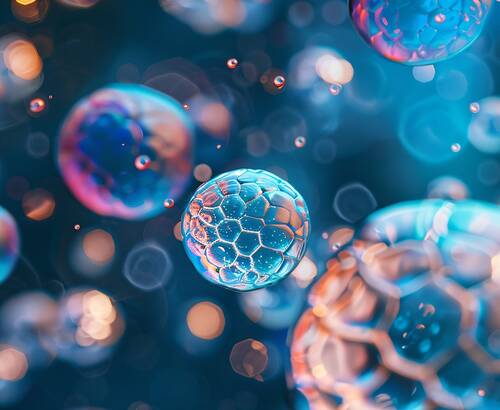14 Jan Separate Roles For Protein Kinases in Embryo Development and Cancer
More on Protein Kinases on MedicalResearch.com MedicalResearch.com Interview with: Dr Angus Cameron Kinase Biology Laboratory Barts Cancer Institute at Queen...25 Nov Obesity: Protein Kinase II and Hepatic Insulin Signaling
MedicalResearch.com Interview with: Ira Tabas, M.D., Ph.D. Richard J. Stock Professor and Vice-Chair of Research Department of Medicine Professor of...28 Jun Two Kinases That Keep Heart Beating May Be Targets For Heart Failure Therapy
MedicalResearch.com Interview with: Dr. Audrey Chang, PhD Kamm-Stull Lab UT Southwestern Medical Center [email protected] MedicalResearch.com: What is the background for...19 Mar Bypass Pathways Allow Some Cancers To Resist Kinase Inhibitor Drugs
MedicalResearch.com Interview with: Douglas.A. Lauffenburger PhD Ford Professor of Biological Engineering, Chemical Engineering, and Biology Head, Department of Biological Engineering...15 Dec Discovering A Protein That Blocks Cells From Becoming Fat Cells
MedicalResearch.com Interview with: Dr. Richard Phipps PhD Department of Environmental Medicine and Flaum Eye Institute, School of Medicine and Dentistry,...27 Jun Kidney Cancer: Nervous System Protein May Provide New Therapeutic Target
MedicalResearch.com Interview with: Dr. John A. Copland, PhD Associate Professor of Biochemistry/Molecular Biology Professor of Cancer Biology Cancer Basic Science...17 Sep Melanoma: PDK1 Kinase Required for Development and Metastasis
MedicalResearch.com Interview with: Ze’ev Ronai, Ph.D. Professor and scientific director of Sanford-Burnham Medical Research Institute La Jolla San Diego, Calif....06 Oct Tyk2 protein potential new Breast Cancer Therapy Target
New Rochelle, NY, October 5, 2011 — A possible new target for breast cancer therapy comes from the discovery that...31 Jul Artificial Antibody Knocks Out Kidney Inflammation
Protein kinase C inhibition may be a potential strategy to alter the course of glomerulonephritis.11 Feb STIVARGA (Regorafenib) For Patients with Unresectable Hepatocellular Carcinoma
This is a real-life observational study of patients with unresectable hepatocellular carcinoma for whom physicians decided to treat with regorafenib.05 Jun Accumulation of Metabolite M-2 Predicts Overall Survival of Chemorefractory Metastatic Colorectal Cancer Patients Treated with Regorafenib (Stivarga®)
The study brought valuable insights into how the body handles regorafenib and its active metabolites.14 Dec Tapeworm Drug May Be Repurposed To Fight Parkinson’s Disease
MedicalResearch.com Interview with: Dr. Youcef Mehellou PhD Lecturer in Medicinal Chemistry Cardiff School of Pharmacy and Pharmaceutical Sciences Cardiff University MedicalResearch.com:...14 Sep Targeted Immunotherapy Can Prevent Some Melanomas From Spreading
MedicalResearch.com Interview with: Dr Alexander Menzies BSc(Med) MBBS (Hons) FRACP PhD Medical Oncologist and Senior Research Fellow at Melanoma Institute...06 Apr Model of RAF Inhibitor Action Provides Roadmap For Resistant Colon and Thyroid Cancer Treatment
MedicalResearch.com Interview with: Poulikos I. Poulikakos, PhD Assistant Professor Department of Oncological Sciences Department of Dermatology The Tisch Cancer Institute...18 Aug Circulating TMAO Levels Correlate with Coronary Plaque Vulnerability and Rupture
MedicalResearch.com Interview with: Lemin Zheng, Ph.D. Professor, Lab Director, and Principal Investigator The Institute of Cardiovascular Sciences and Institute of Systems...24 Apr Fructose Metabolism Offers Potential New Target for Hepatocellular Cancer Diagnosis and Treatment
MedicalResearch.com Interview with: Zhimin (James) Lu, M. D., Ph. D Ruby E. Rutherford Distinguished Professor Department of Neuro-Oncology MD Anderson...09 Apr Autism Pathways Linked To Multisystem Involvement and To Other Disease States
MedicalResearch.com Interview with: Ya Wen PhD TRANSCEND Research, Neurology Department Massachusetts General Hospital, Charlestown, Massachusetts, Harvard Medical School, Harvard University,...04 Feb Single Gene Rearrangement Uses Three Paths To Cause Rare Brain Tumor
Posted at 18:52h
in Author Interviews, Brain Cancer - Brain Tumors, Genetic Research, Pediatrics, University of Pennsylvania
MedicalResearch.com Interview with: Dr. Adam C. Resnick, Ph.D Assistant Professor of Neurosurgery Faculty, Abramson Cancer Center Director of Children’s Brain Tumor...
31 Jul Cancer Drug Can Activate HIV Reservoirs To Target For Eradication
MedicalResearch.com Interview with: Dr. Satya Dandekar PhD Professor and Chair Department of Medical Microbiology and Immunology UC Davis Medical Research:...21 Jun Resveratrol May Help Convert Bad Fat to Good
MedicalResearch.com Interview with: Dr. Min Du Ph.D Department of Animal Sciences Washington Center for Muscle Biology Washington State University Pullman,...19 Mar Melanoma: Targeting Macrophages Increases BRAF Inhibitors’ Effectiveness
MedicalResearch.com Interview with: Russel E. Kaufman, MD President Emeritus Professor, Molecular and Cellular Oncogenesis Program Molecular and Cellular Oncogenesis Program...24 Feb Signaling Pathways That Lead Pancreatic Cancer Identified
MedicalResearch.com Interview with: Peter Storz, Ph.D. Associate Professor & Consultant Department of Cancer Biology Mayo Clinic Jacksonville, FL 32224 ...30 Oct Study Identifies Potential Target In Huntington’s Disease Pathway
MedicalResearch.com Interview with: Srinivasa Subramaniam, Ph.D., Assistant Professor Department of Neuroscience The Scripps Research Institute Jupiter, Florida 33458 Medical...16 Jul Study Probes Hormonal Pathway in Skin That Influences Melanoma Risk
MedicalResearch.com Interview with: John D’Orazio, M.D., Ph.D. Drury Pediatric Research Endowed Chair Associate Professor, Univ. KY College of Medicine Pediatric...09 Feb Obesity and Colon Polyp Risk
Posted at 14:27h
in Author Interviews, Colon Cancer, General Medicine, PLoS, University of Michigan, Weight Research
MedicalResearch.com Interview with: Jenifer I Fenton Assistant Professor Department of Food Science and Human Nutrition Michigan State University East Lansing,...
12 Nov Duke-NUS Finds Genetic Variant in East Asians Makes CML Harder to Treat
The key takeaway is that genetic variations we inherit from our parents, like the BDP, can significantly impact how we respond to standard cancer treatments.29 Oct ACROBiosystems & Diagnostic Biochips Transform Neuroscience Drug Discovery
Posted at 08:55h
in Alzheimer's - Dementia, Author Interviews, Biomarkers, Neurological Disorders, Parkinson's
Diagnostic Biochips leverages advanced neural probes to enhance neuroscience research. These advanced probes, combined with AI-powered data analysis, offer precise insights into neurological disorders such as Alzheimer's and Parkinson's.
05 Apr Mechanism of Horrible Itching of Liver Disease Identified in Superficial Skin Cells
The skin can function as a sensory organ through its epithelial cells, keratinocytes, which can assume a quasi-neural function, telling itch neurons what to do by directly signaling to them cell-to-cell.16 Nov Signaling Pathways Critical to Facial Development, and Birth Defects Identified
The paper focuses very much on what these signaling pathways do during craniofacial development, and loss of the two receptors leads to major defects in closure of the face, and mandibular hypoplasia.- 1
- 2







